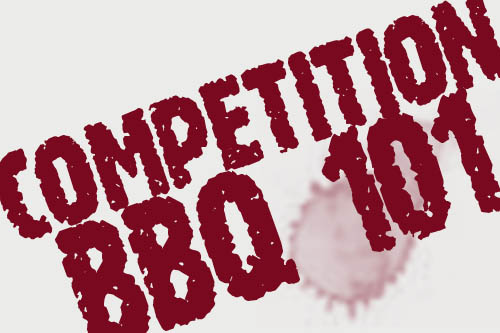
In the first installment of this series I covered the essential gear that you'll need for a competition.
In this post I'll provide a basic high-level overview of what to expect at a typical KCBS competition. There are other competition sanctioning bodies, but so far I have only cooked KCBS events, so that's all I know.
First and foremost, you need to know the KCBS rules very well before you arrive. You don't want to learn them the hard way via a disqualification. If you're not familiar with the rules, I suggest that you read them now. The rest of the information below will make much more sense if you understand the rules.
The typical competition will be held at a large public venue such as a park, fairground, etc. The amount of space you'll have varies and depends on your needs. There will be a standard site size (usually 20' x 20') included in your entry, but you can usually purchase larger sites and even RV spots. Work with the event organizer as soon as possible (especially if you want to bring your RV) to ensure that you'll get the space you need. Electricity is sometimes at a premium, so ask about it early if you'll need it.
As I mentioned in the last post, weather can be, and often is, a huge factor at competitions. You'll want to make absolutely sure that you keep an eye on the forecast and prepare accordingly. Even so, be prepared for what you think might be the worst case scenario.
Standard KCBS competitions are two day events and are most often Friday and Saturday. I would strongly advise against driving a long distance to an event on the same day that it starts. You want to arrive rested and ready for a long weekend. If you show up drained, it's all uphill from there.
OK, on to the timeline. Again, this is a very basic overview. The intent is to simply give you an overall understanding of the flow of a standard competition. Each event has variations, but this is very typical. Ask the organizer for a timeline prior to the event.
Note: This timeline does not take into account optional categories (sauce, dessert, "anything but", sausage, etc.) that are often available at a competition.
Day One
- Arrive at the venue and get to your assigned cook site.
- Unload, set-up your cook site and meet/greet the other teams.
- Eat lunch and socialize with the other teams.
- Cook site and meat inspection.
- Cook's meeting -- this is the time to ask any and all questions.
- Receive your turn-in boxes.
- Start your meat preparation (trimming, seasoning, etc.)
- Eat dinner and socialize with the other teams.
- Start your long cooks (brisket and pork).
- Pre-build (garnish) your turn-in boxes (optional, but highly recommended).
- More socializing with other teams (drunkenness not advised).
- Quiet hours start.
- Sleep! You'll need all you can get.
Day Two
- Wake up early!
- Check your long cooks (brisket and pork).
- Start your medium cook (ribs).
- Eat breakfast.
- Start your short cook (chicken).
- Clean up, rest, and prepare for turn-ins.
- Turn-ins! They are thirty minutes apart with a 10-minute window.
- 11:55 - 12:05: Chicken
- 12:25 - 12:35: Ribs
- 12:55 - 1:05: Pork
- 1:25 - 1:35: Brisket
- Catch your breath and relax a little.
- Clean up and start packing prior to the awards ceremony.
- Awards! This is what it's all about.
- Get your score sheets.
- Finish cleaning and packing.
- Say farewell to the other teams.
- Leave.
Well, there you have it. If it looks like a lot of work and a lot of fun, you're right. At about halfway through your first set of turn-ins you'll be wondering why you ever wanted to do this. However, on the way home (or maybe the next day) you'll be thinking about your next competition. You'll probably be hooked.
Tips:
- I cannot overemphasize the importance of practice. Try at least one practice cook under mock competition conditions.
- Develop your own cooking timeline for each category. Start at the turn-in time and work backward.
- I highly recommend that you take lots and lots of notes. Keep track of what worked well, what didn't, and what to do differently next time.
- Analyze your score sheets and your notes closely while the competition is still fresh in your mind. Write more specific notes for next time.
- Update your gear checklist as you pack. Note any unnecessary items or things you forgot.
- You will be very tired after a competition. Don't plan to drive a long distance home. You'll be barely functional the next day.
Other installments:
The Gear
Tips For Success
Q & A With a First-Time Competitor
Labels: competition, how-to

Post a Comment
Note: Comments containing profanity or blatant promotion/spam will not be published